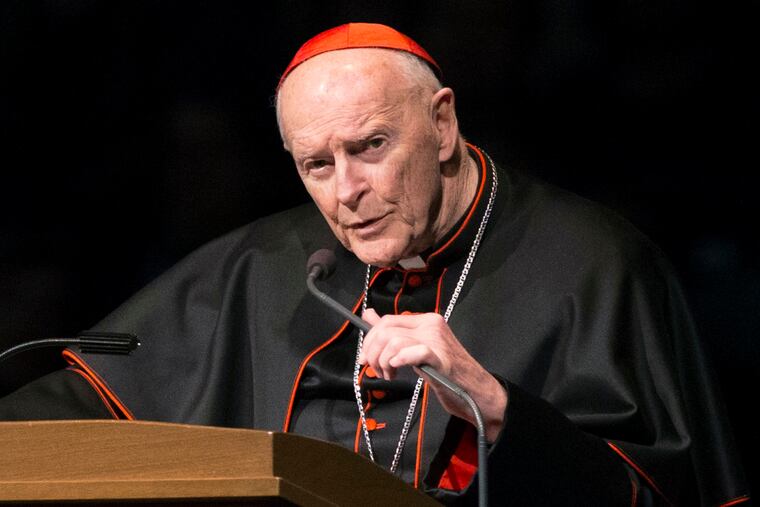Vatican says Pope John Paul II was aware of misconduct allegations against ex-cardinal McCarrick nearly 2 decades before his removal
A Vatican report shows how the church again and again received clues about McCarrick's misconduct with young adults but dismissed them as unsubstantiated or chose to listen to McCarrick's own defense.

ROME — A Vatican report examining the career of Theodore McCarrick says that Pope John Paul II had been informed that the then-bishop shared a bed with young men but decided nonetheless to appoint McCarrick to new and powerful positions within the church.
Providing unprecedented detail into a major abuse case, the report shows how the church again and again received clues about McCarrick's misconduct with young adults, but either dismissed them as unsubstantiated or chose to listen to McCarrick's own defense.
McCarrick, who was defrocked last year after the abuse of minors also came to light, wrote a letter to John Paul II's personal secretary in 2000 in which he said he had never had sexual relations with any person. Months later, the now-sainted pontiff appointed McCarrick as archbishop of Washington.
In its fact-finding prior to that appointment, the Vatican was also misled by several U.S. bishops who did not come clean with what they knew about McCarrick. They said that McCarrick had shared a bed with young men, but they did not indicate with certainty that McCarrick had engaged in sexual misconduct.
"This inaccurate information appears likely to have impacted the conclusions of John Paul II's advisers and, consequently, of John Paul II himself," said the introduction to the report, which was shared with reporters in advance of the full report's publication.
The report, released two years after Pope Francis authorized an internal investigation, amounts to the Vatican's final word on how McCarrick amassed power and prestige in the church, even in the face of rumors — and sometimes written evidence — about his misconduct.
Catholics have been hoping the report could address questions about the extent of impunity and cover-up in one of the highest-profile abuse cases in modern church history. The report is a test for whether the church, after years of pledging to improve transparency, is willing to provide details about its inner-workings and about the failures of people in power.
McCarrick, 90, has become an emblem of the most troubling aspects of the church's abuse crisis — particularly the struggle for accountability in the church's upper ranks. McCarrick's rise was enabled by prelates who'd been warned about his alleged crimes but failed to intervene.
One woman, requesting anonymity to protect the identities of her children, said in an interview that she wrote an unsigned letter to every U.S. cardinal in the 1980s, explicitly describing McCarrick's sexual abuse of her teenage sons.
» READ MORE: The Vatican breaks its silence and explains the pope’s comments about civil unions
The complaints of McCarrick's misconduct reached the Vatican as early as 2000, in the form of a letter from a Manhattan priest. Yet he was formally installed as archbishop of Washington soon after, while summarily earning a cardinal's hat. He hosted dinners for President George W. Bush, presided over memorial services for Washington's elite, and turned into a world-traveling church power broker and diplomat.
He also earned clout as a formidable church fund-raiser, giving money not just to charities but also directly to other clerics — including the ones in the Vatican who would have been involved in assessing the misconduct claims against him.
It was not until 2018 that McCarrick was officially removed from public ministry, after the New York archdiocese publicly revealed a credible allegation of abuse against a minor that dated back to the 1970s. At the same time, two New Jersey dioceses revealed they had reached settlements with adult victims. Soon, other seminarians came forward, describing how McCarrick had forced them to share a bed at a weekend beach house.
McCarrick was defrocked by the church last year, a historic punishment for a one-time cardinal.
McCarrick was named a cardinal by John Paul II, and some Vatican officials had braced for the possibility that the report could tarnish the reputation of his pontificate.
McCarrick's case, when it became public, caused extraordinary tremors within the U.S. church, which has been contending for more than two decades with the scale of the sexual abuse crisis. The ripples spilled across the global church soon after, when a former Vatican ambassador to the United States, Carlo Maria Viganò, released a public letter saying that both Francis and his predecessor, Pope Benedict XVI, had known about McCarrick's misconduct with young men.
Viganò portrayed Benedict as trying to quietly discipline McCarrick and Francis as lifting those sanctions. A former McCarrick aide has since bolstered Viganò claim that the Vatican had tried to push McCarrick to retreat from public life during Benedict's papacy. But it is also clear that, even while Benedict remained pope, McCarrick ignored the orders and retained his role as a world-traveling representative of the church.
In the aftermath of Viganò's letter, Francis authorized a “thorough” study of the Vatican archives related to McCarrick — the origins of the report released Tuesday.
"The Holy See is conscious that, from the examination of the facts and of the circumstances, it may emerge that choices were taken that would not be consonant with a contemporary approach to such issues," the Vatican statement at the time said.
Francis initially did not respond directly to Viganò's accusations, but said last year in an interview that, regarding McCarrick, he “knew nothing. Obviously, nothing, nothing.”